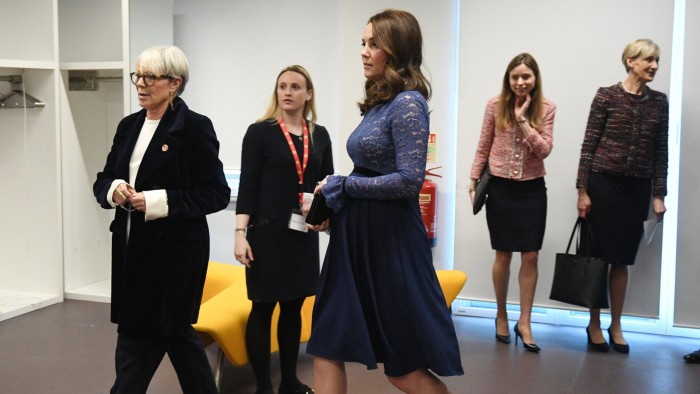[ad_1]
Unlock the Editor’s Digest for free
Roula Khalaf, Editor of the FT, selects her favourite stories in this weekly newsletter.
A maternity wear group that was part of the 2021 rush of London stock market listings has collapsed into administration, two years after being taken private by its former backers at a 90 per cent discount.
Seraphine Group, whose clothes were worn by Catherine, Princess of Wales, during her pregnancies, ceased trading on Monday. Administrators from Interpath Advisory were appointed to take control of the business shortly after the Financial Times revealed it was filing for administration.
Seraphine floated in July 2021 with “BUMP” as its stock market ticker and was one of a flurry of listings that year.
It listed with a £150mn valuation, raising £56mn from investors, but swiftly crashed in value, making it one of the many disastrous listings from that vintage.
Mayfair Equity Partners, which used the proceeds from the listing to pay off loans, bought back the retailer two years later for £15.3mn.
Seraphine had hired Interpath this month to find new investors amid challenging circumstances, but the process failed.
While there had been some interest in buying the brand, no viable investor had emerged for the whole of the business, said one person familiar with the matter.
Interpath said on Monday that the majority of Seraphine’s 95 employees had been made redundant. Will Wright, UK chief executive of Interpath, said Seraphine had been hit by “rising costs and brittle consumer confidence”.
Interpath said it would explore options for the business and its assets, including the Seraphine brand.
Seraphine Group’s accounts had been overdue at Companies House. Unaudited accounts for its UK subsidiary show its sales fell 18.9 per cent to £38.4mn in the year to March 2024 while operating losses grew from £5.1mn to £8.2mn. It had one store in Kensington, west London and also sold products online.
Seraphine was founded in 2002 by Cecile Reinaud, after she had designed outfits for several pregnant friends.
In a LinkedIn post two months ago, Reinaud expressed disappointment at how the business had been run since she sold it.
“Many of these events can be linked to the brand being floated on the public market just six months after my sale and departure. The pressure of being a public company is immense: back-to-back sale process placed too much strain on the leadership team, which in turn impacted performance”, she said.
She also criticised the decision to replace the brand’s head designer and “abandon our unique British heritage and signature regal purple”.
Many of the companies in London’s 2021 IPO cohort have left investors nursing big losses.
Food delivery group Deliveroo, which listed with a £7.6bn valuation, struck a £2.9bn deal in May to be taken over by DoorDash. Chip designer Alphawave has also agreed a $2.4bn takeover by US semiconductor group Qualcomm, less than half its valuation when it listed.
Recommended
Cybersecurity group Darktrace was also taken private last year but the deal was at a significantly higher valuation than its listing price.
A quarter of the biggest companies in London’s 2021 vintage have since left the stock market while those remaining have lost £10bn in value, according to FT analysis.
The figures highlight the UK’s struggle to attract and retain top-tier businesses on its public markets.
Mayfair declined to comment.
[ad_2]
Source link


